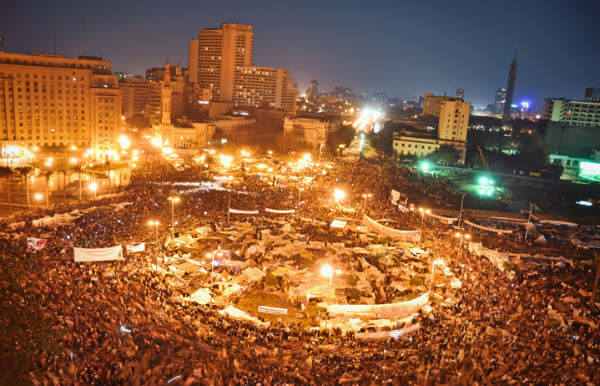Murtaza Hussain reports: While in jail [in Cairo], [Mohamed] Soltan [a 26-year-old citizen of both Egypt and America] says he witnessed the recruitment efforts of Islamic State members. “There were people from across the spectrum of Egyptian society in jail: liberals, Muslim Brotherhood members, leftists, Salafis, and some people who had pledged allegiance to ISIS,” Soltan says. “Everyone felt depressed and betrayed, except for the ISIS guys. They walked around with this victorious air and had this patronizing and condescending attitude towards everyone else.”
Among the facilities in which Soltan was incarcerated was the notorious Tora Prison, where he was kept in an underground dungeon with dozens of other prisoners. Between regular beatings, humiliation, and torture by guards, the prisoners would talk to one another. In this grim environment, ISIS members would attempt to convince others of the justice of their cause. “The ISIS guys would come and tell everyone these nonviolent means don’t work, that Western countries only care about power and the Egyptian regime only understands force,” Soltan says. “They would say that the world didn’t respect you enough to think you deserve democracy, and now the man who killed your friends is shaking hands with international leaders who are all arming and funding his regime.”
While the other political factions represented in Egypt’s jails grappled with a seemingly hopeless situation, Islamic State members were consistently filled with hope and optimism, citing a steady stream of “good news” about their state-building project in Iraq, Syria and Egypt’s Sinai Peninsula, Soltan says.
When the prisoners would discuss their circumstances, even avowed leftists found themselves unable to rebut Islamic State members’ arguments. “They would make very simple arguments telling us that the world doesn’t care about values and only understands violence,” says Soltan. “Because of the gravity of the situation they were all in, by the time the ISIS guys were finished speaking, everyone, the liberals, the Brotherhood people, would be left completely speechless. When you’re in that type of situation and don’t have many options left, for some people these kinds of ideas start to make sense.” [Continue reading…]
The headline for this article in The Intercept reads: “ISIS RECRUITMENT THRIVES IN BRUTAL PRISONS RUN BY U.S.-BACKED EGYPT” — as though the phrase “U.S.-backed” is the only reliable hook for the publication’s readers.
Yes, the fact that the Obama administration continues to provide military aid to the Sisi regime in spite of its appalling human rights record is inexcusable. What this otherwise excellent report neglects to mention, however, is that Sisi’s most generous supporters been Gulf states — driven by their fear of the Muslim Brotherhood.
And while the U.S. has a terrible track record in supporting authoritarian rule across the Middle East, blame for the stifling of representative government needs to be apportioned more widely, including the roles played by Russia, Iran, the UK, and other European powers.

